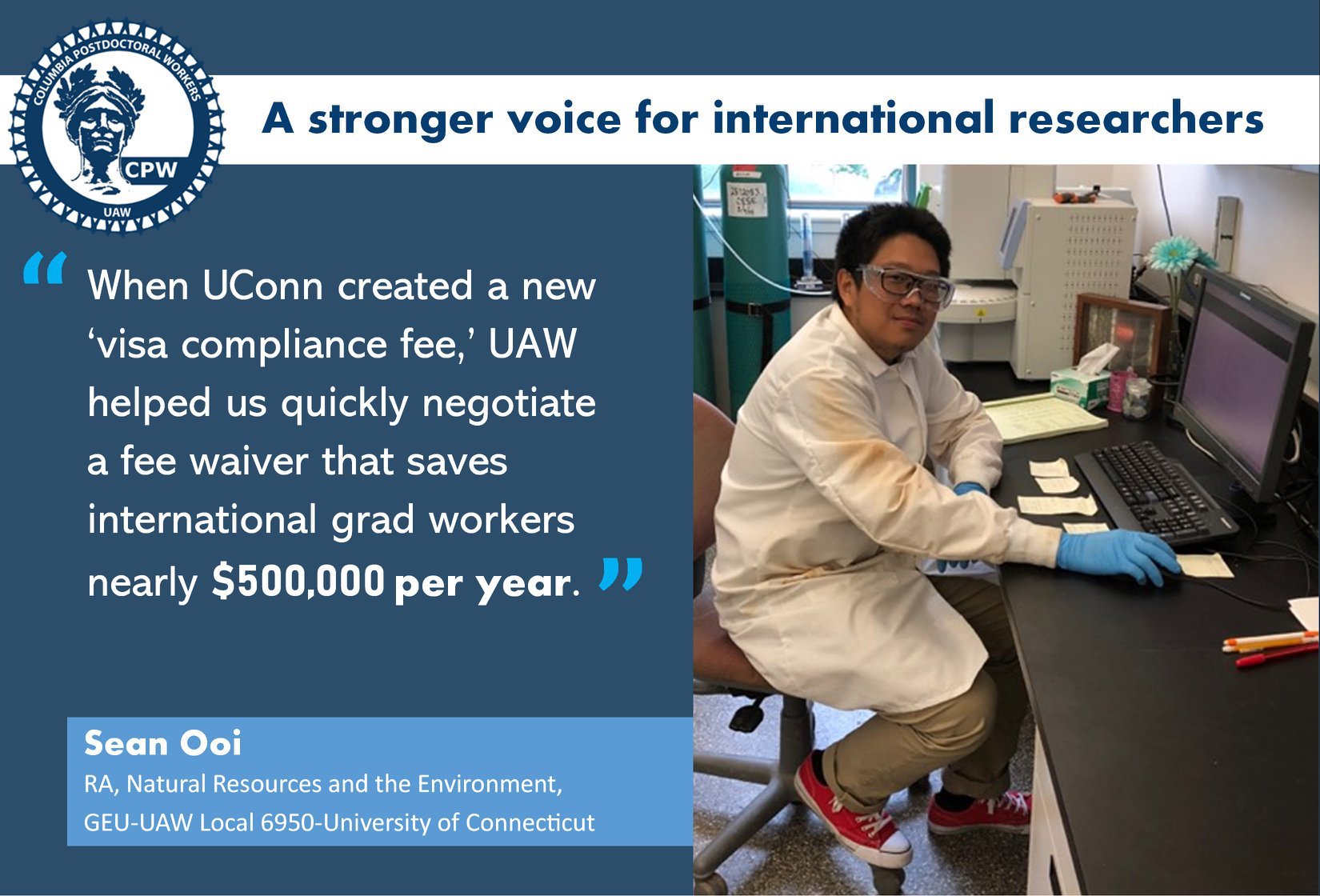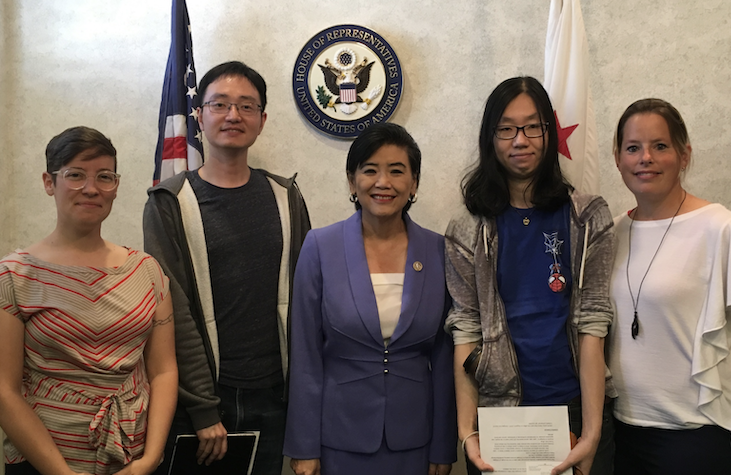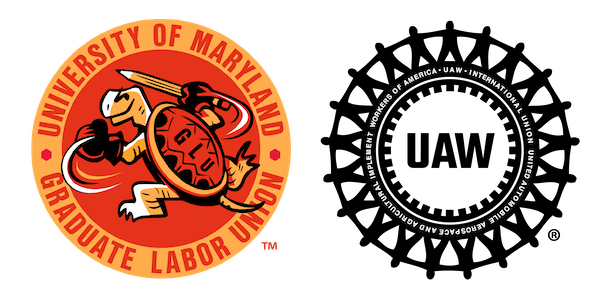Support for International Students
What difference does unionization make for international students?
International students are an integral part of the community of graduate workers at UMD. In addition to the overall upheaval that accompanies relocation, we have to contend with unique challenges at the workplace: visa and immigration precarity, complicated tax laws, zero support finding housing and settling into the community, and insufficient support from poorly-informed department administrators. This is where forming a union can help graduate workers generally and international graduate workers specifically! By unionizing, we can collectively bargain for a more supportive and equitable workplace that is sensitive to our status as non-citizens.
What legal rights do international student workers have to join and participate in a union in the U.S.?
The freedom of association guaranteed under the United States Constitution protects your right to belong to a union, and tens of thousands of international students are already members of academic unions at both public and private institutions around the US, including the Union of Academic Student Employees at the University of California (UAW 2865), the Union of Academic Student Employees and Postdocs at University of Washington (UAW 4121), Graduate Employee Union-UAW at the University of Connecticut (UAW 6950), and the Graduate Employee Organization at the University of Massachusetts (UAW 2322 and UAW 1596).
“International graduate students are especially vulnerable to abuse and exploitation by employers due to the unique challenges we face. Fear and anxiety surrounding our visa status can prevent us from advocating for ourselves, but we deserve better. Under US law, graduate students doing teaching or research work are employees regardless of citizenship status. This means we have the legal right to organise and bargain with the University as equals, without retaliation. Together, we should collectively bargain for improvements and protections, and support each other in times of uncertainty.”
– Akanksha Singh
5th year PhD student, Department of Atmospheric and Oceanic Sciences
How Unions Make a Difference
International scholars have always faced challenges and precarity on account of our status as visa holders. In 2020, the federal government increased the pressure on visa-holders by issuing a number of short-sighted and xenophobic policies, from requiring international students to attend classes in person during the COVID-19 crisis or risk deportation, to restricting H1B visas, to the Muslim travel ban, to restrictions on Chinese international scholar visas, and more. These actions have created tremendous stress, concern and uncertainty for international researchers and our futures.
The precarious position international graduate workers face can also compound the many sources of stress we experience from the high cost of living and lack of affordable housing, to insufficient family-friendly benefits, and can leave many of us without options when faced with unfair termination, unreasonable work expectations, or harassment.
By forming a union, international graduate workers can negotiate for additional protections. Through their contracts, for example, UC Postdocs have won increased rights for international Postdocs by ending UC’s practice of denying health benefits for many international Postdocs and ensuring equal treatment regardless of immigration status.
In addition to new rights and economic improvements that often uniquely benefit international workers, Columbia University Postdocs also won increased job stability by guaranteeing that appointments must be held open for at least 60 days if work authorization is delayed, paid time off for immigration-related proceedings, greater ability to work remotely if unable to return to the US, and enforceable protections against discrimination and harassment.
UAW has also been a critical resource and provided a political voice for international students and scholars to affect national policy. UAW Academic Workers have used their collective strength to:
- write thousands of letters to elected officials
- protest outside of ICE offices and share our stories with the press
- host information sessions with immigration attorneys
- and submit formal declarations filed in lawsuits to overturn xenophobic policies.


In October of 2020, UAW Academic Workers mobilized against a proposed rule by ICE to shorten visa stays for international scholars; thousands of public comments were submitted, including by the President of the UAW International. In July of 2020, thanks to the direct action by UAW Academic Workers across the country, in addition to efforts by our university and government allies, ICE backed down from its directive to deport international students taking online classes due to COVID-19. In 2017, the UAW International filed an amicus brief in the Supreme Court case challenging the Trump administration’s travel ban.

UAW 2865 and UAW 5810 members protest outside of ICE offices in San Francisco, summer 2020

UAW Local 2865 and UAW 5810 union members with Congresswoman Judy Chu discussing her Dear Colleague Letter in support of Chinese international students at her office in Pasadena, 2018.
Nationally, the UAW represents more than 100,000 workers in higher education, a powerful force for effective lobbying. Working with members of Congress, UAW academic workers helped win the Optional Practical Training STEM extension. UAW Locals 5810, 2865 and 4121 representing Postdocs and Student Workers in Washington and California also worked with Congressional Representatives Judy Chu and Pramila Jayapal on a Dear Colleague letter demanding that Secretary of State Pompeo restore the validity period of Chinese international students’ entry visas from 12 months back to 60 months.
Your Title Goes Here
Your content goes here. Edit or remove this text inline or in the module Content settings. You can also style every aspect of this content in the module Design settings and even apply custom CSS to this text in the module Advanced settings.
Can I sign a union authorization card if I’m on a F-1/J-1 visa?
As an international student worker, your right to belong to a union is protected by the right to freedom of association guaranteed in the United States Constitution. Graduate worker unions have existed for nearly 40 years and there have been no known cases of problems with either the law or with visa status because of union activity. In recent decades, more than 100,000 higher ed workers have joined UAW, and each one of those campaigns have had international workers in highly visible leadership roles.
Are there any restrictions on political activity by international students?
All international students enjoy the same rights to freedom of expression and freedom of association as U.S. nationals. Federal law protects your right to join a union. However, students on visas are prohibited from making financial donations to political candidates and political parties under federal law. That said, many international students contribute by volunteering time. For example, international students have joined for canvassing, phonebanking, and meetings with elected officials.
What rights and protections have international student workers won through unionization at other institutions?
UAW represents Over 100,000 academic workers. Through unionizing, academic employees at other institutions have fought for and won protections for international students in particular. Other international student workers have:
- Formed support networks to build community to help one another adapt to living in the US. This includes providing accurate information about changing US immigration policy (like hosting information sessions with immigration attorneys).
- Used collective bargaining to address issues in the workplace that especially impact international scholars, like winning guaranteed vacation days, waiving extra fees that international students and non-resident students are forced to pay, protecting the right to work from abroad during COVID-19, and protecting visa-holders from unjust termination.
- Worked for better US immigration policy, like increasing access to Optional Practical Training (OPT), opposing the “Fixed Duration of Status” rule, and working with members of congress Judy Chu (San Gabriel Valley) and Pramila Jayapal (Seattle) to oppose the 1-year period of validity for Chinese entry visas. The Western States International Working group, made up of international UAW members from across the west coast, has created this list of priorities for ongoing lobbying efforts.
We are not alone! International student workers across the U.S. are involved in organizing unions at their own institutions. Check out their resources and info on what improvements they’re organizing for:
